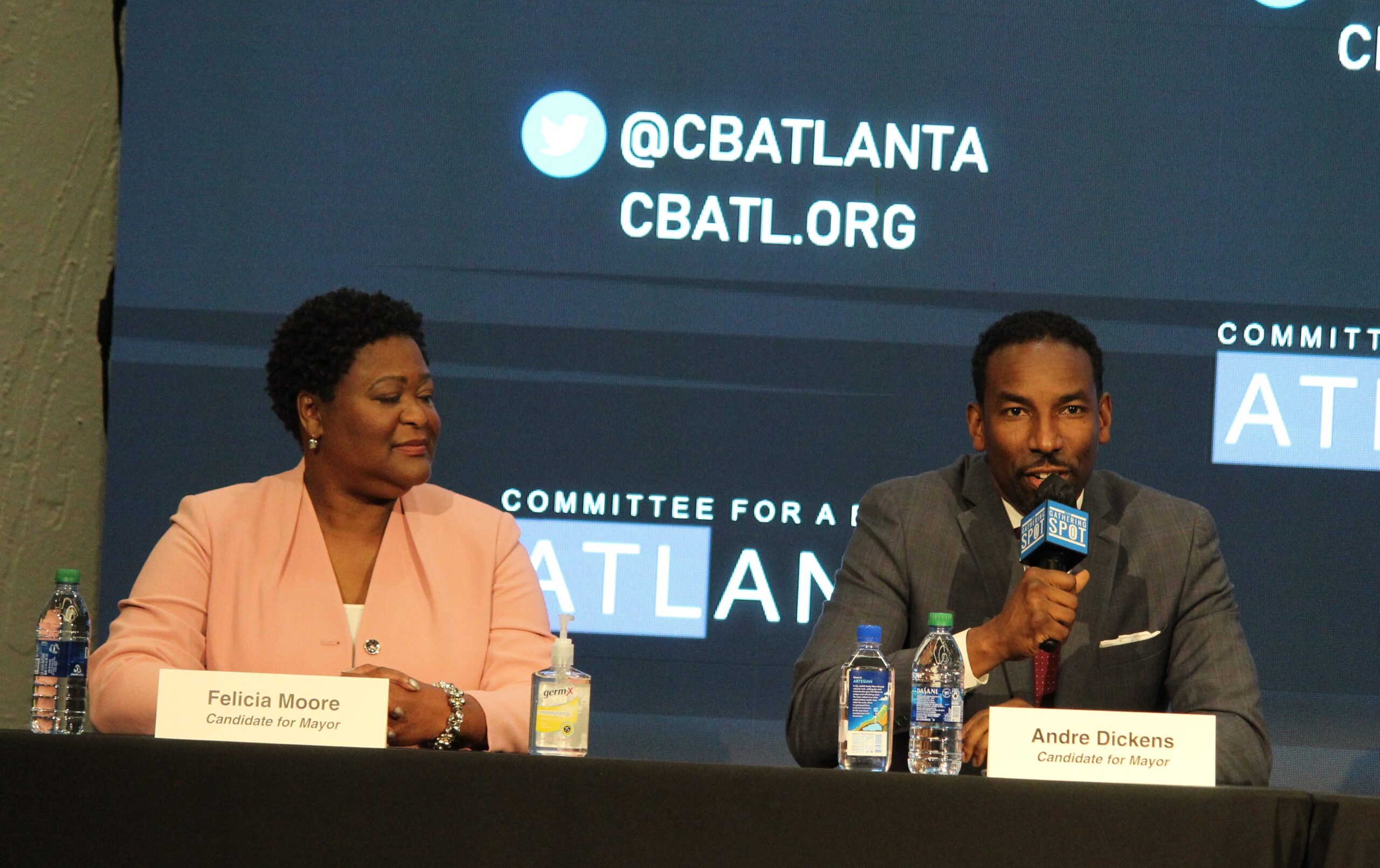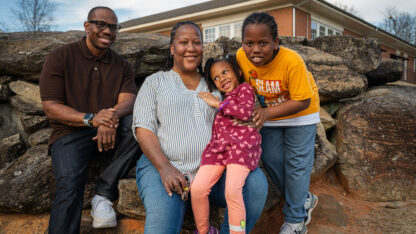How will Atlanta’s next mayor keep the city affordable? Read the candidates’ answers

Ahead of the runoff election on Nov. 30, WABE asked the city’s two mayoral candidates, Councilmember Andre Dickens and Council President Felicia Moore, to share their top strategies for responding to the affordability crisis.
Emil Moffatt / WABE News
As Atlanta grows, so does the cost of living in the city. The pressure on renters and homeowners may be one of the biggest challenges for Atlanta’s next mayor.
Ahead of the runoff election on Nov. 30, WABE asked the city’s two mayoral candidates, Councilmember Andre Dickens and Council President Felicia Moore, to share their top strategies for responding to the affordability crisis.
The candidates prioritized collaborations with the public agencies already working on low-income housing, like the Atlanta Housing Authority and Invest Atlanta. Dickens called for the city to protect residents through community benefits agreements with developers while Moore proposed new workforce development jobs to help seniors keep up their homes. Both agreed on the need to address property tax increases for longtime homeowners in fast-appreciating neighborhoods.
See their full responses below.
As mayor, what is the FIRST thing you’d do to…
…ensure low-income renters can afford to live in areas of the city with good schools and other amenities?
Moore: Being day-one ready to be mayor of Atlanta means being able to work the day after the election to make this city affordable. I won’t need to wait until my January inauguration to make a difference. On Dec. 1, I will set a meeting with the Atlanta Housing Authority to take action to clear the 12-18 month backlog and get people living at the edge of poverty into high-quality, low-income housing. Many of these people are seniors and single-parent families. Winter is fast approaching, and it’s cruel to keep these people waiting any longer
Immediately after the election, I will also meet with our state partners so we can take action and distribute the federal emergency rental assistance funds. Georgia has been one of the slowest to distribute these funds, and it’s unconscionable to me that our state will have to send some of that money back for use by other states that are doing it more efficiently.
We also need a public service campaign to help educate our citizens on how to access these funds. People are confused or just uniformed, and as elected officials, we have to do a better job of making it easier for our residents and businesses to access the support and services they need to stabilize and thrive.
Dickens: An immediate step that I will take is to focus on building mixed-income housing in Atlanta on city-owned land. As mayor, I will build or preserve 20,000 units of affordable housing over the next eight years. We have 800 acres of land that the City of Atlanta owns that we can turn into affordable housing units. We’ve seen where building mixed-income communities can work. We’ve seen it in places like Centennial Place and West Highlands and East Lake. We currently have land that we can build upon where people with different levels of income can all live in the same community and their kids can go to the same schools and they can buy their food at the same local grocery stores.
Also, since 2010, Atlanta’s housing costs have increased 50%, but the income of working folks has only increased 10%. As our housing costs increase, that means residents have less money for their groceries, their medicine, their daycare and their transportation costs. It’s clear that one thing that we don’t want to see is people having to drive in each day and drive back out at night because they can’t afford to live in the city.
Also, through Invest Atlanta, I changed the incentive program to say that we will never give incentives unless you set aside 10-15% of the units for affordability. We have to focus on developing on the vacant land with mixed-income, amenity-driven developments.
…help longtime homeowners stay in neighborhoods with rising home prices that will drive up property taxes?
Dickens: This is really a moral issue, and our legacy residents deserve to live in Atlanta. These are the folks that educated me while I was at Mays High School, Southwest Middle School and L.P. Miles. We have to look out for them.
As mayor, I will have an Office of Anti-Displacement in our city to help. I will set aside their assessments to make sure their property values won’t go up a certain rate just because someone built a half-a-million-dollar home next to them. Our seniors should have a tax freeze on their increases.
We also have the ability to create protections for our residents through community benefits agreements — where developers come into an area and we make sure that residents benefit from those large-scale developments, they don’t get displaced, and have an opportunity not to have their taxes increased. We have to make sure residents can continue to live in the communities they are already in and have access to the new amenities in the area. We will do development without displacement through community benefits agreements.
Also, along the BeltLine Westside Trail, I created a housing rehabilitation program for seniors to have their roofs and windows fixed and guard rails installed so that they can stay in their homes. As mayor, I will continue these programs. I will also make sure our legacy residents have a trust or a will so that they can pass these along to their kids or to a person of their choice so that we don’t have people coming in from the outside and buying a grandmother’s lifelong home. That will be a part of my stabilization plan as well.
Moore: Our seniors and longtime residents are the people who built our neighborhoods and imbued each one with a unique vibe. Visitors to our city enjoy exploring the fun qualities of each neighborhood. More importantly, I believe that the original investors in a neighborhood must feel like they aren’t being chased out just because a house down the street is renovated or a speculator has scooped up a row of houses to develop multi-million-dollar clusters.
That’s why, as soon as I’m elected, I’m going to work with our partners at the Atlanta Public Schools and Fulton County to provide caps on property tax assessments for longtime residents. Folks should be able to retire in the homes where they’ve built their lives, raised their families or where they just age in place.
There’s also an intersectional solution to help longtime residents remain in their homes. In my first 100 days, I’m going to rebuild our workforce development agency to partner with unions, tech companies and other corporations to provide paid training, internships and apprenticeships. Those who want to get above-living wage jobs in the trades will be able to help to fortify the homes of seniors and those in neighborhoods experiencing economic distress. These workers will be able to install ramps and safety equipment that seniors need or fix roofs and provide other important repairs. Solutions like these are a win-win-win for homeowners, our workers, and neighborhoods.
…address homelessness in Atlanta in a way that differs from past initiatives?
Dickens: In Atlanta, we currently have about 3,200 people that are considered homeless, but our shelters are only at 70% occupancy.
We still have 30% more space, but during the pandemic, we have particularly seen the problem of people being afraid to live in close quarters to someone else during this time, or that they don’t really know how they will be treated by others in the shelters. This is a complex problem, but my solution is to have a housing first model. It’s very difficult to assess a person’s situation while they’re choosing to live in a tent or out in front of a building.
You have to get them to a clean and dry place to live with access to a warm meal and a hot shower. From there, we can find them the treatment or support care that they need. That’s why we have the Continuum of Care, PAD, and Partners for Homes all working together. We can then get them back on the right track with a job at a place like Goodwill or First Step Staffing or Georgia Works.
Moore: For many years, Atlanta led the nation in making homelessness rare, brief and non-recurring, thanks to the work of leaders like Jack Hardin, the Regional Task Force on Homelessness, Gateway Center, Union Mission, Partners for Home and others. The pandemic and the resulting eviction crisis stalled our progress, and the closure of the Peachtree and Pine shelter put hundreds of people back on the streets.
Immediately after I’m elected, I’m going to identify two or three buildings that are owned by the City of Atlanta and which can be rapidly renovated into no- to low-barrier shelters with specific emphasis on the needs of seniors, women and families for whom there are precious few beds available at present.
I’m also going to convene a meeting with our agency partners and the city managers of the HOPWA funding program. There is no excuse for delays in processing federal funds through our city to agencies providing homes for those living with AIDS. It hurts our most vulnerable citizens, the housing providers and the service agencies.
My approach is different because it is micro-targeted to the most severe points of pain in our city, and it doesn’t continue penalizing those who don’t wish to accept the barriers placed in front of them by other service providers.
…create a sustainable source of funding for affordable housing long-term?
Dickens: We have to make sure we’re providing housing that’s affordable. It’s clear people want to live in the City of Atlanta, and not have to drive an hour each day going back and forth for work. We haven’t seen affordable housing being built in Atlanta over the last 12 years or so. We have parts of Atlanta that are essentially vacant land where we can build mixed-income housing.
A top goal of mine is mobility in our city and I think we can do a better job at being more data driven at City Hall. I’m an engineer and care a lot about metrics. I also want to see people move up the ladder and be able to afford homes in our community. For example, when Microsoft announced they were coming to Atlanta, I looked at Brad Smith, the president, and said it’s good that you’re going to have buildings in Atlanta, but I want to know how many Atlantans are going to be in your buildings. I want to see people stand up on their own as well through their own success, buy homes in Atlanta and stay here.
We need to explore options surrounding Catalytic Capital for a recurring source of affordable housing. In addition, we can increase acquisitions and transactions at the Land Bank Authority and expand our Community Land Trusts. There are options, but they all start with us building on the vacant land that we already have in our city and expanding from there.
Moore: (No response given.)








